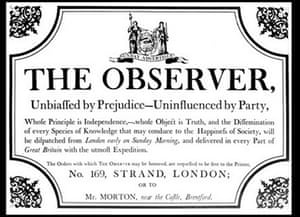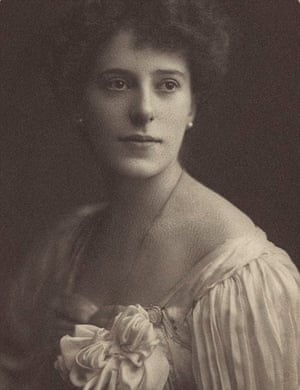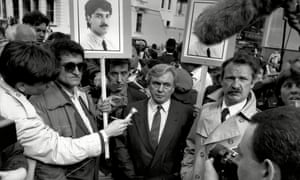
4 DECEMBER 1791
The first issue of the Observer is published, the day before the death of Mozart, from a small office at 169 The Strand, London, by Irish entrepreneur WS Bourne. Four pages long and with advertisements on its front page, it was advertised as “Unbiased by Prejudice – Uninfluenced by Party”, and its objectives as “truth, and the dissemination of every species of knowledge that may conduce to the happiness of society”. More prosaically, Bourne’s premise was that the newspaper “would obtain him a rapid fortune”: within three years he was £1,600 in debt. Thus setting a familiar blueprint for __more than two centuries: a heady cocktail of unimpeachably high aims and financial innumeracy.
10 NOVEMBER 1793
The newspaper carries a detailed report of the last moments of Marie Antoinette before her execution. Twelve years later, we report on Nelson’s victory and death at Trafalgar.
11 MAY 1812
Prime minister Spencer Perceval is shot and killed in the Commons. Not only does the Observer’s Vincent George Dowling get the story, but he arrests the assassin. Dowling would avail himself of a further scoop in 1820, meeting Queen Caroline in France and being entrusted with her despatches: he had to hire an open boat and cross the Channel in a storm to bring back the story. Rapid technological change over subsequent decades meant filing copy would never again be so tiresomely problematic – until the Tandy laptops of 1983.
1814
The Observer is bought by William Innell Clement, who would defy the Lord Chief Justice’s order banning coverage of the Cato Street conspiracy trial, paving the way for freedom of court reporting. The newspaper was developing a characteristic of serious, stroppy innovation, and this would continue: it was one of the first newspapers to recognise the power of illustration (woodcuts), and the attraction of book reviews. In 1848 numerous inches were ceded to coverage of Chartist meetings, calling for universal suffrage, equal representation and vote by ballot. Under Joseph Snowe, the Observer championed the abolitionist North in the American civil war: this (of course) costs the newspaper dear in terms of circulation.

1891
Rachel Beer, wife of sickly Observer proprietor Frederick Beer and far __more interested (and interesting) than he, takes over editing duties on the newspaper (and the Sunday Times), becoming Fleet Street’s first female editor.
1908
The new proprietor is Alfred Harmsworth, later Lord Northcliffe, who also owns the (gasp) Daily Mail. He appoints as editor James Louis Garvin, a brilliantly talented journalist who makes many innovations that would be shamelessly copied by the other Sunday publications – but not before Northcliffe resigns in 1911 after numerous editorial disagreements, sending Garvin the telegram “EITHER YOU GET OUT OR I DO”. William Waldorf Astor buys the newspaper for £45,000 – and keeps Garvin.
1942
George Orwell first writes for the newspaper, arguing for Indian independence. In the same year the Observer replaces front-page advertisements with news, and Garvin, at 74, ends his spectacular reign.
1948
Astor’s grandson David takes over as editor, detaching the Observer from its conservative tradition to become a non-party newspaper. There begins something of a golden age. The newspaper starts to (unpopularly, of course) highlight South Africa’s apartheid regime. Photographer Jane Bown completes her first assignment for the newspaper (Bertrand Russell); Muriel Spark wins the newspaper’s first short-story competition; and a year later Kenneth Tynan, enfant terrible of the theatre world and the first man to drop the F-bomb on TV, becomes drama critic. Patrick O’Donovan, Michael Davie and Terence Kilmartin join a starry cast creating a postwar, anti-imperialist, splendid bright liberal baby.
1956
Astor devotes an entire issue to the full transcript of the “secret speech” of Soviet leader Nikita Krushchev, denouncing Joseph Stalin – all 26,000 words. The newspaper sells out. The same year, the handling of the Suez crisis by prime minister Anthony Eden culminates in a famous editorial accusing the government of “folly and crookedness”. The accusations are vindicated, but there are a spate of furious cancellations, including from “Mr and Mrs Denis Thatcher” of Chelsea.
1964
The Observer launches a colour magazine, with an exclusive on Lord Louis Mountbatten, the editor’s former wartime boss.
1976
Donald Trelford takes over from Astor as editor. The Observer, in – who’d have guessed it? – dire financial trouble, is sold to American oil firm Atlantic Richfield, who within five years sell it to “Tiny” Rowland of Lonrho. Rowland’s later spat with Mohammed Al-Fayed would result in 1990 in an infamous and unprecedented midweek edition of the Observer, prompted not only by truculent proprietorial petulance, but mainly.

1990
Observer journalist Farzad Bazoft, is executed in Iraq for “spying for Israel”, an allegation later fully exposed as nonsense. There is an unedifying lack of outrage in some British government circles: one not shared at the Observer.
1993
The Guardian Media Group buys the Observer, bringing it under the Scott Trust and guaranteeing future editorial independence. Scoops follow: Major’s secret talks with the IRA; New Labour’s cash for access scandal; science editor Robin McKie’s world exclusive on Dolly the sheep, the first cloned mammal.
2000
Observer Sport Monthly is launched and quickly becomes a commercial and critical success. Observer Food Monthly arrives a year later, and still wins (and gives) awards.

2003
In a leader article entitled “Iraq: the case for decisive action” the Observer backs an invasion, a position it later says was a mistake. The same year the newspaper breaks news of the NSA/GCHQ bugging scandal to spy on UN powers in the run-up to the Iraq invasion. Whistleblower Katharine Gun, and Observer journalists, will soon be immortalised in the film Official Secrets.
2007
The Observer is voted national newspaper of the year at the British press awards.
2015
Observer cartoonist Chris Riddell becomes Children’s Laureate.
2016
The Brexit vote and Donald Trump’s election in the US send shockwaves around the world – and help bolster sales of the Observer as readers seek a liberal understanding of the new political reality. And so the newspaper continues with its 1791 objective: “Truth,Unbaised by Prejudice”, when the search for veracity is arguably tougher than ever before.